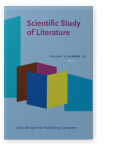Vol. 12:1/2 (2022) ► pp.133–163
Preaching to the Choir and Beyond
The power of a narrative to change moral attitudes
Do narratives about suffering enhance empathy? Readers experience empathy for story characters, but does that empathy spill over into the “real” world? We investigated whether a narrative in the form of a memoir by an undocumented immigrant in the United States (compared to an expository account about undocumented immigrants) softens attitudes towards this group. Across three studies, the narrative yielded greater attitude change in the direction of empathy than did the expository reading, with this effect in some cases still visible one month later. We conclude that, compared to an expository account, a narrative about the suffering of an individual in a marginalized group renders attitudes towards members of this group more positive for those already sympathetic (Study 1) and for those initially unsympathetic (Studies 2 and 3). Study 3 demonstrated that this effect generalized to attitudes about Black Americans despite no mention of race relations in the narrative.
Article outline
- Literature overview
- Affective and trait empathy
- Altruistic (prosocial) behavior
- Attitude change
- The present research
- Study 1
- Method
- Participants
- Materials and procedure
- Time 1
- Time 2
- Time 3
- Scoring
- Attitude
- Memory
- Experience-taking
- Analysis plan
- Attitude
- Memory
- Experience-taking
- Results
- Attitude
- Memory
- Experience-taking
- Knowing an undocumented immigrant
- Donate
- Discussion
- Method
- Study 2
- Participants
- Materials and procedure
- Results
- Attitude
- Memory
- Experience-taking
- Knowing an undocumented immigrant
- Donate
- Attitude
- Discussion: Studies 1–2
- Unequal time on task
- Narrative text contained some expository text
- Swiping vs. scrolling
- Did participants guess the intent of the study?
- Donation measure
- Study 3
- Participants
- Materials and procedure
- Readings
- Memory measure
- Additional attitude scale
- Experience-taking
- Donation
- Results
- Immigrant attitude
- Race attitude
- Memory
- Experience-taking
- Knowing an undocumented immigrant
- Donate
- 6.General discussion
- Acknowledgements
-
References
